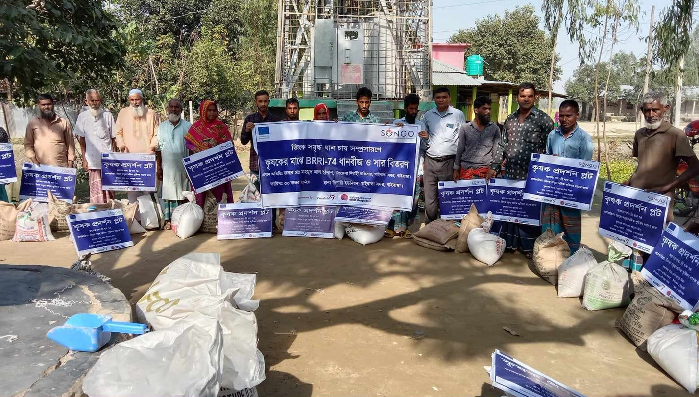

Md Ariful Islam : Rice is one of the most widely consumed staple foods globally. Rice is the seed of the grass species Oryza sativa varIndica and Japonica (Asian rice), or less commonly, Oryzaglaberrima (African rice). China and India are the biggest producers, and Bangladesh has the world’s highest per-capita consumption (735g per day). Asia accounts for 90 percent of rice consumption globally. Rice requires special growing conditions; while it is produced over vast areas of the world, the requirements for growing it are specific: a high average daytime temperature but cooler nights during the growing season; a plentiful supply of water applied as needed; and a smooth land surface to facilitate uniform flooding and drainage. Some countries can have two rice crops per year with a rainfed crop and an irrigated crop.
Research shows that Zinc possesses the high potentiality for increasing the immunity of the human body and people always would love to take nutrition from natural sources instead of artificial ones. According to harvest plus, biofortified rice is as good a source of zinc as fortified rice and can help combat zinc deficiency. Biofortifying rice with mineral fertilizers increases the zinc content. Despite nutrient losses that occur during processing, biofortified rice can provide up to 50 percent of the daily zinc needs for children. Zinc intake from parboiled rice-biofortified or not- is less than for non-parboiled rice.
Micro nutrients are vitamins and minerals such as vitamin-A, zinc and Iron. Although micronutrients are required in a very small amount for the human body, Zinc is an important micronutrient for maintaining good health, the immune system and children’s growth and development, As the body is not stored in zinc so regular intake is required. Generally, zinc deficiency manifests poor growth and increases the risk of infections.
By taking the supplementation of Zinc from bio fortified rice, consumers can fulfill the zinc requirement where they have no access to zinc enriched foods (e.g., red meat and poultry, beans, nuts, seafood, whole grains, fortified breakfast cereals, and dairy products). Zinc is mainly stored in the outer bran layer of the rice. But in Bangladesh people always want to purchase white rice where the brown part has already been removed. As a result, though consumers are taking bio fortified rice, they are not getting benefits.
The European Union funded Sustained Opportunities for Nutrition Governance (SONGO) project has taken this initiative to popularize the bio fortified zinc rice among 112000 households in Kurigram and Gaibandha districts which is being implemented by Cordaid and RDRS Bangladesh. To achieve the target, nutrition sales agents have conducted community sessions for increasing the consumer awareness of community people on the importance of zinc and how they can easily get zinc from biofortified rice. Alongside, SONGO capacitated 962 small holder farmers on production technologies of bio fortified rice and established 962 demonstration plots at the communities for popularization of bio fortified rice.
With the support from Harvest plus, SONGO has created awareness among 10,000 farmers on the importance of bio-fortified seeds to address malnutrition. Created awareness among 10,000 farmers about the benefits of maintaining a bank account. Banks/bank agents are supported to reach 10,000 farmers to open a bank account for purchasing bio-fortified seeds. Support HarvestPlus to connect the agri-MSMEs, dealers (stockiest), and FBAs to the farmer groups for promoting biofortified zinc rice seeds. Eventually, the fortified foods are not affordable to the base of the pyramid population, so we need to promote the bio fortified zinc rice to large scale farmers through cluster based production. So far, Bangladesh Rice Research Institute (BRRI) has developed a good number of bio fortified rice varieties for both Aman and Boro season. The Department of Agricultural Extension (DAE) has a greater role for extension of the varieties across the country. Simultaneously, Bangladesh Agricultural Development Corporation (BADC) need to produce and market a large volume of seed for the farmers.
